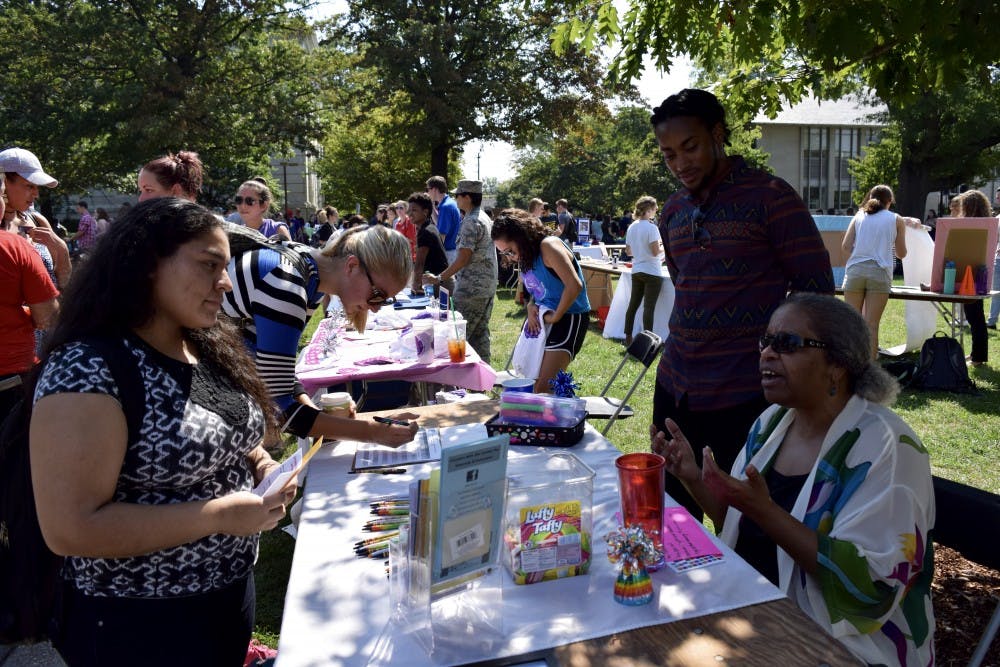The Center for Diversity and Inclusion is preparing for this fall’s Intergroup Dialogue, a seven week program aiming to bring identity issues on campus to the forefront through group discussions led by student, staff and alumni facilitators.
There are six dialogue groups running this semester, covering topics such as race, gender, sexuality, nationality, culture and societal inequalities, according to Coordinator of Dialogue and Diversity Programs Michelle Strange. The weekly sessions, which are set to start the week of Oct. 3 and go until the week of Nov. 17, are open to all in the AU community who complete an application by Sept. 18.
“Each group has a specific theme but what is important to know about dialogue and any group is that regardless of the theme, each group works in an intersectional lens, so we talk about multiple issues simultaneously,” Strange said. “If you are sitting in class thinking, ‘I really want to talk about issues of identity,’ and you are looking for spaces to talk about issues of identity, issues of difference, you are not alone, so do it with us.”
Participating in the program allows students to hear different perspectives and gain unique insight on the topics discussed, according to Graduate Coordinator of Dialogue and Diversity Programs Mary Stone Hanley. Every effort is made to ensure each group is made up of a diverse set of participants so that a variety of perspectives can be heard.
“It’s an opportunity to build community, to interact with others, to ignite your imagination and creativity, to ask questions and to find questions you didn’t know were there, to find other people who are questioning and to be of service,” Hanley said.
The discussions provide space for deep self reflection as well as reflection on larger social issues like the influence of appearance on identity and collaborating with people from different racial, ethnic, and socio-economic backgrounds. These conversations are especially important for first year students who may be searching for a place to process the new environment they are in, Strange said.
Belén Bonilla, a sophomore in the School of International Service and a facilitator for one of the dialogue groups, “Exploring Social Inequities and Privileges on Campus – What Is Our Role?” sees the upcoming discussions as an opportunity to talk about problems students face on campus. She hopes that participants become aware of existing issues they may never have thought about in depth so that they can then find a way to make a difference.
“We all come to AU from a million different backgrounds, but at the end of the day, we all came to AU and we all have something to offer,” Bonilla said. “When we don’t promote a diverse and inclusive campus, we perpetuate the exclusion that takes place outside the safe space that AU strives to be.”
There has been ongoing outreach to try to get faculty members to incorporate Intergroup Dialogue into their courses, with some allowing students to earn credit by participating in the discussions, according to Strange. The center is always looking for new faculty to join the conversation and hopes the list of interested members continues to grow, she said.
“Faculty really enjoy being able to give students ways to apply what they are learning in the classroom in a different setting,” Strange said. “So for the faculty that have added dialogue to their syllabus, they are really happy with the outcome, specifically because it is a seven week program so it is sustained conversation and not a one time program where students can talk about their learning which in some ways can be limiting.”
According to the center’s Graduate Coordinator of Education and Training Sean Furmage, the dialogue coordinators would like to improve upon finding participants who are committed to the program throughout its duration, which could be achieved through continuing outreach to faculty to promote Dialogue in their classes.
“People who participate often participate again and they often come back to facilitate,” Furmage said. “It’s an experience that they haven't always had. They haven’t always had that space to have a conversation like that.”
Chika Ekemezie, a sophomore in the School of Public Affairs and the undergraduate coordinator of outreach and community building for the center, said that having spaces for healthy discussion is part of what is needed to create an inclusive University, especially after social media posts targeting minorities surfacing last academic year that caused frustration among many on campus. Being involved with Intergroup Dialogue is part of the solution in creating an accepting environment moving forward, according to Ekemezie.
“There’s only so much learning you can do out of a book or even watching a video, but seeing people and hearing their experiences, it’s really something that can’t be replicated,” Ekemezie said. “You have to go out there and do it.”
Clarification appended: The original story stated that students were the program facilitators. It has been clarified to also include that staff and alumni can act as facilitators. The original story also stated that applications were open to all; it has been clarified to say that applications are open to all in the AU community.


